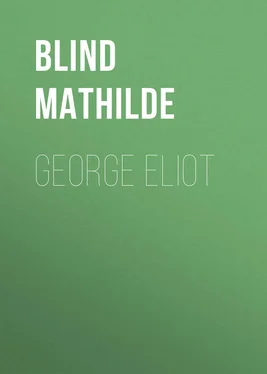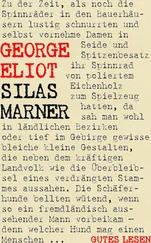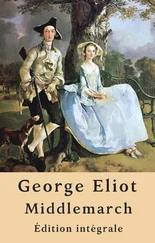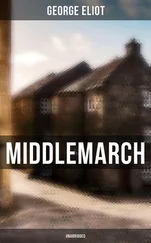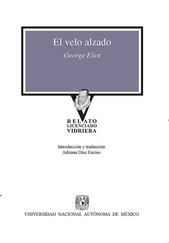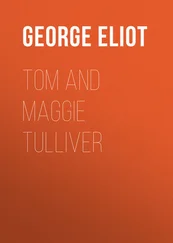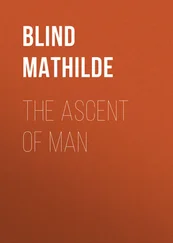Mathilde Blind - George Eliot
Здесь есть возможность читать онлайн «Mathilde Blind - George Eliot» — ознакомительный отрывок электронной книги совершенно бесплатно, а после прочтения отрывка купить полную версию. В некоторых случаях можно слушать аудио, скачать через торрент в формате fb2 и присутствует краткое содержание. ISBN: , Жанр: foreign_antique, foreign_prose, Биографии и Мемуары, на английском языке. Описание произведения, (предисловие) а так же отзывы посетителей доступны на портале библиотеки ЛибКат.
- Название:George Eliot
- Автор:
- Жанр:
- Год:неизвестен
- ISBN:http://www.gutenberg.org/ebooks/36847
- Рейтинг книги:3 / 5. Голосов: 1
-
Избранное:Добавить в избранное
- Отзывы:
-
Ваша оценка:
- 60
- 1
- 2
- 3
- 4
- 5
George Eliot: краткое содержание, описание и аннотация
Предлагаем к чтению аннотацию, описание, краткое содержание или предисловие (зависит от того, что написал сам автор книги «George Eliot»). Если вы не нашли необходимую информацию о книге — напишите в комментариях, мы постараемся отыскать её.
George Eliot — читать онлайн ознакомительный отрывок
Ниже представлен текст книги, разбитый по страницам. Система сохранения места последней прочитанной страницы, позволяет с удобством читать онлайн бесплатно книгу «George Eliot», без необходимости каждый раз заново искать на чём Вы остановились. Поставьте закладку, и сможете в любой момент перейти на страницу, на которой закончили чтение.
Интервал:
Закладка:
These extracts pleasantly illustrate both the writer and recipient of such humane letters; and, though written at a much later period, not only give an idea of the nature of Mrs. Bray's literary pursuits, but of the friendly relations subsisting to the end between her and George Eliot.
Of Miss Hennell's work it is more difficult to speak without entering more deeply into her subject-matter than is compatible with the scope of the present work. In one of her best known books, entitled 'Thoughts in Aid of Faith,' she makes the daring attempt to trace the evolution of religion, her mode of thought partaking at once of the scientific and the mystical. For the present she seems to be one of the very few women who have ventured into the arena of philosophy; and, curiously enough, her doctrine is that there should be a feminine method in metaphysics as well as a masculine, the sexes, according to this singular theory, finding their counterpart in religion and science. It may be remembered that George Eliot, in one of her essays, is of opinion that women should endeavour to make some distinctively feminine contributions to the intellectual pursuits they engage in, saying, "Let the whole field of reality be laid open to woman as well as to man, and then that which is peculiar in her mental modification, instead of being, as it is now, a source of discord and repulsion between the sexes, will be found to be a necessary complement to the truth and beauty of life. Then we shall have that marriage of minds which alone can blend all the hues of thought and feeling in one lovely rainbow of promise for the harvest of happiness." Something of the same idea lies at the root of much in Miss Hennell's mystical disquisitions.
This circumstantial account of the circle to which Miss Evans was now introduced has been given, because it consisted of friends who, more than any others, helped in the growth and formation of her mind. No human being, indeed, can be fully understood without some knowledge of the companions that at one time or other, but especially during the period of development, have been intimately associated with his or her life. However vastly a mountain may appear to loom above us from the plain, on ascending to its summit one always finds innumerable lesser eminences which all help in making up the one imposing central effect. And similarly in the world of mind, many superior natures, in varying degrees, all contribute their share towards the maturing of that exceptional intellectual product whose topmost summit is genius.
The lady who first introduced Marian Evans to the Brays was not without an object of her own, for her young friend – whose religious fervour, tinged with evangelical sentiment, was as conspicuous as her unusual learning and thoughtfulness – seemed to her peculiarly fitted to exercise a beneficial influence on the Rosehill household, where generally unorthodox opinions were much in vogue.
Up to the age of seventeen or eighteen Marian had been considered the most truly pious member of her family, being earnestly bent, as she says, "to shape this anomalous English Christian life of ours into some consistency with the spirit and simple verbal tenor of the New Testament." "I was brought up," she informs another correspondent, "in the Church of England, and have never joined any other religious society; but I have had close acquaintance with many dissenters of various sects, from Calvinistic Anabaptists to Unitarians." Her inner life at this time is faithfully mirrored in the spiritual experiences of Maggie Tulliver. Marian Evans was not one who could rest satisfied with outward observances and lip-worship: she needed a faith which should give unity and sanctity to the conception of life; which should awaken "that recognition of something to be lived for beyond the mere satisfaction of self, which is to the moral life what the addition of a great central ganglion is to animal life." At one time Evangelicalism supplied her with the most essential conditions of a religious life: with all the vehemence of an ardent nature she flung her whole soul into a passionate acceptance of the teaching of Christianity, carrying her zeal to the pitch of asceticism.
This was the state of her mind, at the age of seventeen, when her aunt from Wirksworth came to stay with her. Mrs. Elizabeth Evans (who came afterwards to be largely identified with Dinah Morris) was a zealous Wesleyan, having at one time been a noted preacher; but her niece, then a rigid Calvinist, hardly thought her doctrine strict enough. When this same aunt paid her a visit, some years afterwards, at Foleshill, Marian's views had already undergone a complete transformation, and their intercourse was constrained and painful; for the young evangelical enthusiast, who had been a favourite in clerical circles, was now in what she afterwards described as a "crude state of freethinking." It was a period of transition through which she gradually passed into a new religious synthesis.
Her intimacy with the Brays began about the time when these new doubts were beginning to ferment in her. Her expanding mind, nourished on the best literature, ancient and modern, began to feel cramped by dogmas that had now lost their vitality; yet a break with an inherited form of belief to which a thousand tender associations bound her, was a catastrophe she shrank from with dread. Hence a period of mental uncertainty and trouble. In consequence of these inward questionings, it happened that the young lady who had been unwittingly brought to convert her new acquaintances was converted by them. In intercourse with them she was able freely to open her mind, their enlightened views helping her in this crisis of her spiritual life; and she found it an intense relief to feel no longer bound to reconcile her moral and intellectual perceptions with a particular form of worship.
The antagonism she met with in certain quarters, the social persecution from which she had much to suffer, are perhaps responsible for some of the sharp, caustic irony with which she afterwards assailed certain theological habits of thought. It is not unlikely that in some of her essays for the Westminster Review she mainly expressed the thoughts which were stirred in her by the opposition she encountered at this period of her life – as, for example, in the brilliant paper entitled 'Worldliness and Otherworldliness,' which contains such a scathing passage as the following:
"For certain other elements of virtue, which are of more obvious importance to untheological minds, – a delicate sense of our neighbour's rights, an active participation in the joys and sorrows of our fellow-men, a magnanimous acceptance of privation or suffering for ourselves when it is the condition of good to others, in a word, the extension and intensification of our sympathetic nature, we think it of some importance to contend, that they have no more direct relation to the belief in a future state than the interchange of gases in the lungs has to the plurality of worlds. Nay, to us it is conceivable that to some minds the deep pathos lying in the thought of human mortality – that we are here for a little while and then vanish away, that this earthly life is all that is given to our loved ones, and to our many suffering fellow-men, lies nearer the fountains of moral emotion than the conception of extended existence… To us it is matter of unmixed rejoicing that this latter necessity of healthful life is independent of theological ink, and that its evolution is ensured in the interaction of human souls as certainly as the evolution of science or of art, with which, indeed, it is but a twin ray, melting into them with undefinable limits."
It was, of course, inevitable that her changed tone of mind should attract the attention of the family and friends of Marian, and that the backsliding of so exemplary a member should afford matter for scandal in many a clerical circle and evangelical tea-meeting. Close to the Evanses there lived at that time a dissenting minister, whose daughter Mary was a particular favourite of Marian Evans. There had been much neighbourly intimacy between the two young ladies, and though there was only five years' difference between them, Marian always inspired her friend with a feeling of awe at her intellectual superiority. Yet her sympathy – that sympathy with all human life which was the strongest element of her character – was even then so irresistible that every little trouble of Mary's life was entrusted to her keeping. But the sudden discovery of their daughter's friend being an "infidel" came with the shock of a thunderclap on the parents. Much hot argument passed between the minister and this youthful controversialist, but the former clinched the whole question by a triumphant reference to the dispersion of the Jews throughout the world as an irrefutable proof of the divine inspiration of the Bible. In spite of this vital difference on religious questions, Miss Evans was suffered to go on giving the minister's daughter lessons in German, which were continued for two or three years, she having generously undertaken this labour of love twice a week, because she judged from the shape of her young friend's head – phrenology being rife in those days – that she must have an excellent understanding. But, better than languages, she taught her the value of time, always cutting short mere random talk by simply ignoring it. Altogether the wonderful strength of her personality manifested itself even at this early period in the indelible impression it left on her pupil's memory, many of her sayings remaining graven on it as on stone. As, for instance, when one day twitting Mary's too great self-esteem she remarked, "We are very apt to measure ourselves by our aspiration instead of our performance." Or when on a friend's asking, "What is the meaning of Faust?" she replied, "The same as the meaning of the universe." While reading 'Wallenstein's Lager ,' with her young pupil, the latter happened to say how life-like the characters seemed: "Don't say seemed ," exclaimed Marian; "we know that they are true to the life." And she immediately began repeating the talk of labourers, farriers, butchers, and others of that class, with such close imitation as to startle her friend. Is not this a fore-shadowing of the inimitable scene at the 'Rainbow?'
Читать дальшеИнтервал:
Закладка:
Похожие книги на «George Eliot»
Представляем Вашему вниманию похожие книги на «George Eliot» списком для выбора. Мы отобрали схожую по названию и смыслу литературу в надежде предоставить читателям больше вариантов отыскать новые, интересные, ещё непрочитанные произведения.
Обсуждение, отзывы о книге «George Eliot» и просто собственные мнения читателей. Оставьте ваши комментарии, напишите, что Вы думаете о произведении, его смысле или главных героях. Укажите что конкретно понравилось, а что нет, и почему Вы так считаете.
